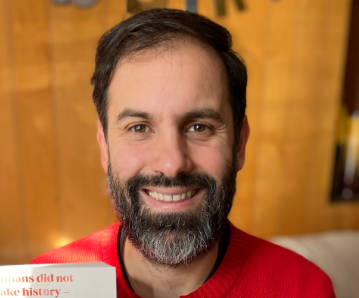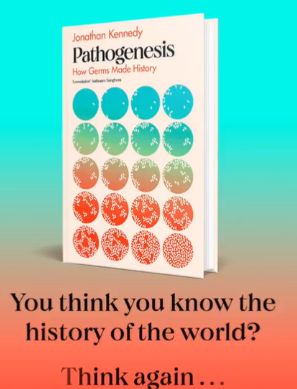Jon Kennedy’s Pathogenesis: BBC Radio 4 Book of the Week
Jon Kennedy’s hugely successful book, Pathogenesis, has been selected for serialisation by BBC Radio 4 as their Book of the Week, starting on 29 May. The book has had splendid reviews across all major media outlets, and Jon has been appearing at a range of literary and other festivals across the country.

We asked Jon how he came to write the book, and how he felt about the media attention it has attracted:
‘I started to write the book during the covid-19 pandemic. Everyone seemed to be saying that the death and disruption was unprecedented and extraordinary. Having studied and taught public health from a historical perspective, I knew this wasn’t the case. Since humans first adopted settled agriculture about 12,000 years ago, pandemics have periodically killed millions of people and brought whole civilizations crashing down. This wasn’t all bad news, however, as this devastation created the space for new societies and new ideas to emerge.
When analysing the past from the perspective of pathogens, it becomes apparent that they have been the protagonists in many of the most important social, political, and economic transformations - from the rise of Christianity and Islam, to the emergence of capitalism and the welfare state. But this isn’t just about history. Unprecedented population growth, factory farming, incursions into animal habits, and long distance travel have created the perfect conditions for new pathogens to emerge and spread. This raises the question: how will pandemics impact the future and how can we make sure they result in positive change?
I wanted to write book that brought together a vast array of research from different disciplines - classics, economics, and genomics; anthropology, sociology, and microbiology - but was accessible and interesting to an audience beyond the narrow confines of academia. I was happy to see Pathogenesis was not just reviewed in places like Nature but also the Economist, Guardian, FT and Washington Post. The attention is a little bit unnerving but it is fantastic that people are reading the book and that some of them even seem to enjoy it.’

